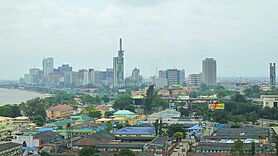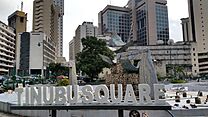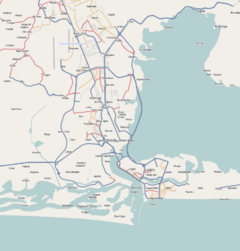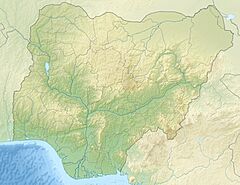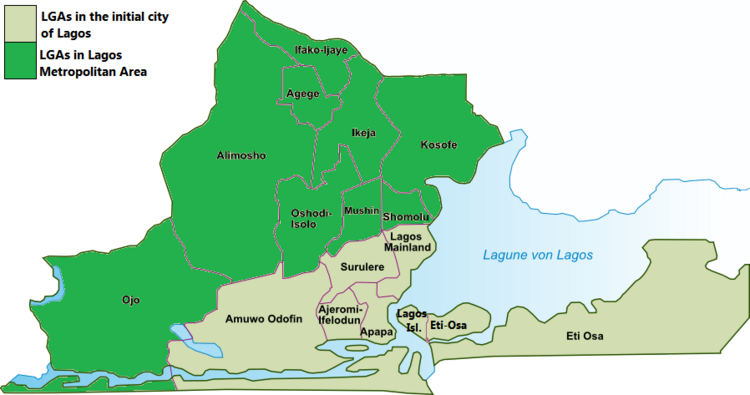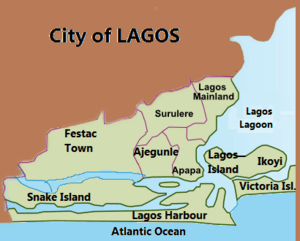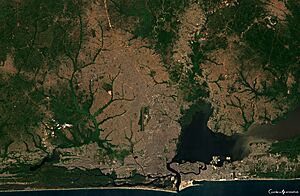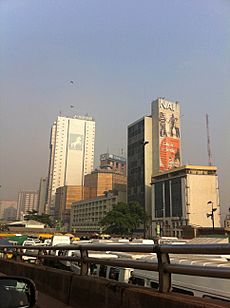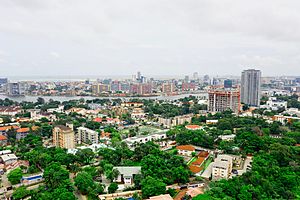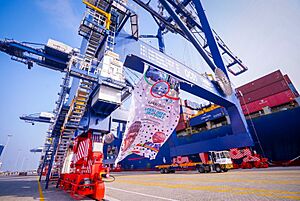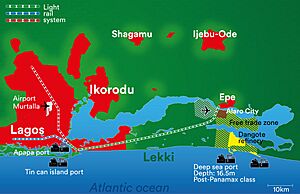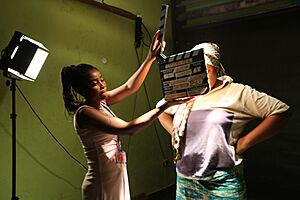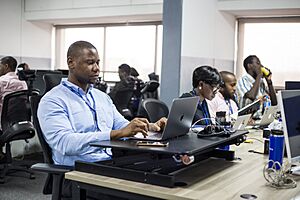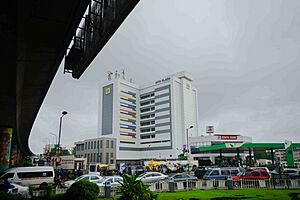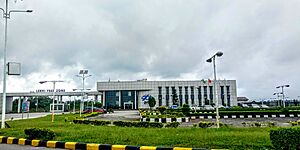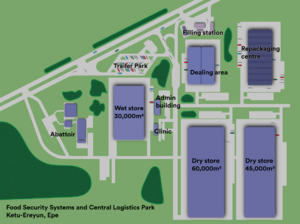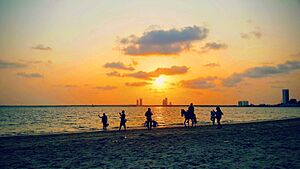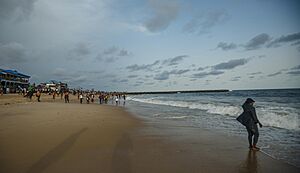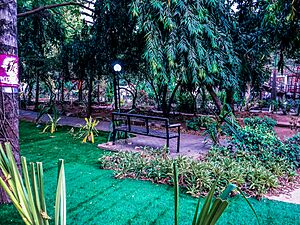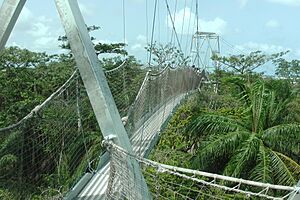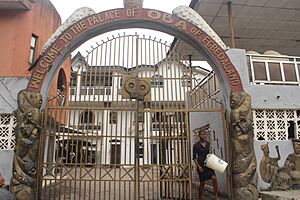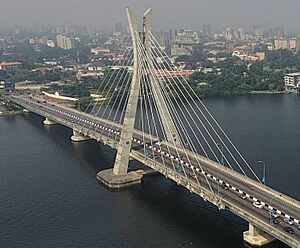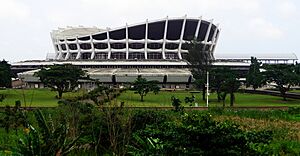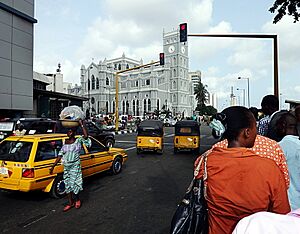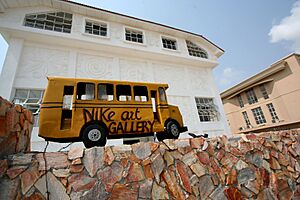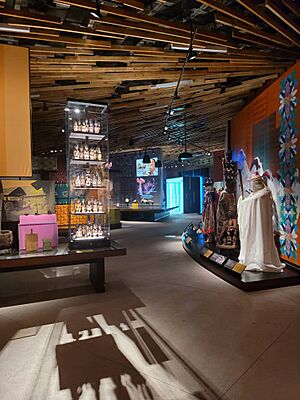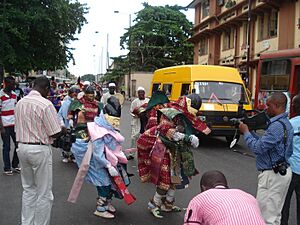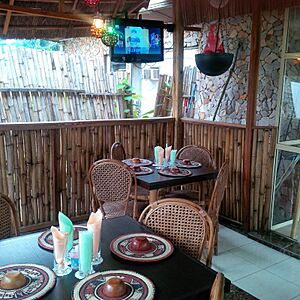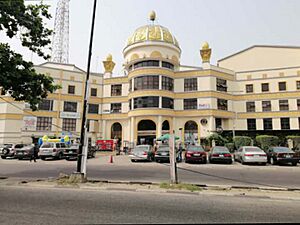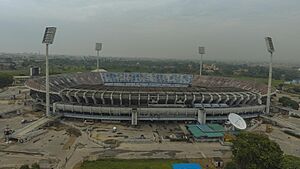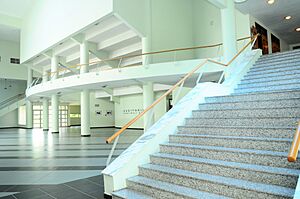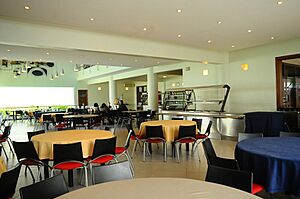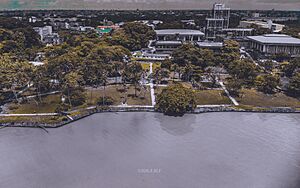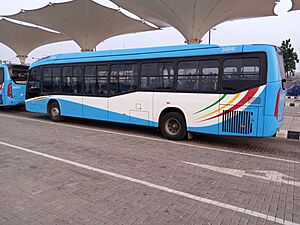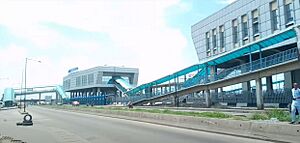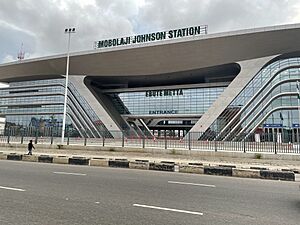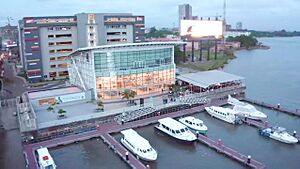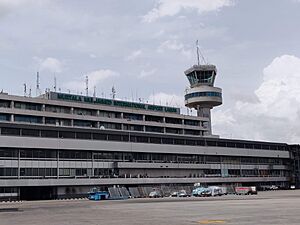Lagos facts for kids
Quick facts for kids
Lagos
Èkó (Yoruba)
|
|
|---|---|
|
Lagos Island skyline from Victoria Island
Civic Tower
Tinubu Square
Lekki–Epe Expressway
National Arts Theatre
Lekki-Ikoyi Link Bridge
Cathedral Church of Christ
|
|
| Nickname(s):
Eko akete, Lasgidi
|
|
| Motto(s):
Èkó ò ní bàjẹ́! (Yoruba, literally, "Lagos will not spoil!"; colloquially, "Lagos will prevail!")
|
|
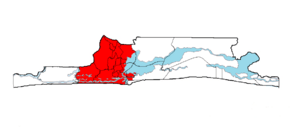
Lagos shown within the State of Lagos
|
|
| Country | |
| State | Lagos |
| LGA(s) |
List of LGAs
Island
Apapa Eti-Osa Lagos Island Mainland Ajeromi-Ifelodun Lagos Mainland Surulere Suburban Agege Alimosho Ifako-Ijaiye Ikeja Kosofe Mushin Ojo Oshodi-Isolo Shomolu Amuwo-Odofin |
| Settled | 15th century |
| Founded by | Awori subgroup of the Yoruba |
| Area | |
| • Metropolis | 1,171.28 km2 (452.23 sq mi) |
| • Land | 999.6 km2 (385.9 sq mi) |
| • Water | 171.68 km2 (66.29 sq mi) |
| • Urban | 907 km2 (350 sq mi) |
| • Metro | 2,706.7 km2 (1,045.1 sq mi) |
| Elevation | 41 m (135 ft) |
| Population
(2006 census)
|
|
| • Metropolis | 8,048,430 |
| • Estimate
(2018 by LASG)
|
16,437,435 |
| • Rank | 1st |
| • Density | 6,871/km2 (17,800/sq mi) |
| • Urban | 16,637,000 |
| • Urban density | 14,469/km2 (37,470/sq mi) |
| • Metro | 21,000,000 (estimated) |
| • Metro density | 7,759/km2 (20,100/sq mi) |
| Demonym(s) | Lagosian |
| GDP | |
| • Metropolis | ₦ 41.2 trillion US$ 102 billion (2021) |
| • Per capita | US$ 6,600 (2021) |
| Time zone | UTC+1 |
| Area code(s) | 010 |
| Climate | Aw |
Lagos (pronounced LAY-goss) is a huge city in southwestern Nigeria. It's the biggest city in Nigeria and the most populated urban area in all of Africa, with an estimated 21 million people!
Lagos used to be the capital city of Nigeria until 1991, when the government moved the capital to Abuja. Today, Lagos is a major financial hub in Africa. It's super important for commerce, entertainment, technology, education, politics, tourism, art, and fashion across Africa. Lagos is also one of the world's fastest-growing cities. It's a megacity, meaning it's a very large urban area. It has the fourth-highest GDP (which means it produces a lot of wealth) in Africa. It also has one of the largest and busiest seaports on the continent.
Lagos started as a home for the Awori people, a group within the Yoruba, back in the 15th century. They lived on islands that are now part of Lagos Island, Eti-Osa, Amuwo-Odofin, and Apapa. The Awori people lived and worked on a farmstead called Ereko, which is where the local name "Eko" comes from. These lands are separated by creeks that flow into the Lagos Lagoon. Long sand spits and barrier islands like Bar Beach protect the area from the Atlantic Ocean.
Because the city grew so fast, it expanded west of the lagoon. This led to Lagos being divided into two main parts: the Island, which was the original city, and the Mainland, where it grew. Lagos was once directly managed by the government. But in 1967, Lagos State was created. This split Lagos city into seven Local Government Areas (LGAs) and added other towns to form the state.
The capital of Lagos State moved to Ikeja in 1976. Even though Lagos is still called a city, today's "Metropolitan Lagos" is actually a huge urban agglomeration (a big city area made of many towns). It includes 16 LGAs, including Ikeja. This large area covers 37% of Lagos State's land but is home to about 85% of its people.
The exact population of Metropolitan Lagos is debated. The 2006 census said it had about 9 million people. However, the Lagos State Government estimated it at around 16 million. Lagos is growing very fast, adding about 1.1 million people each year. By 2022, the population of the greater Lagos area was estimated to be around 28 million. This means Lagos might be Africa's most populated city, even bigger than Kinshasa. Some unofficial numbers from 2015 put the population of "Greater Metropolitan Lagos" (which includes areas stretching into Ogun State) at about 21 million.
Lagos is home to the University of Lagos, one of Nigeria's first universities. The city's business area includes Tinubu Square. Murtala Muhammed International Airport, named after a former Nigerian president, is one of Africa's busiest airports. The Lagos National Stadium has hosted many international sports events.
Contents
- What's in a Name?
- History of Lagos
- How Lagos is Governed
- Population of Lagos
- Geography of Lagos
- Climate of Lagos
- Economy of Lagos
- Tourism in Lagos
- Culture of Lagos
- Sports in Lagos
- Education in Lagos
- Healthcare in Lagos
- Transportation in Lagos
- Waste, Water, and Sewage
- Famous People from Lagos
- Sister Cities
- Images for kids
- See also
What's in a Name?
The name Lagos comes from a Portuguese word meaning "lakes." In British and Nigerian English, it's usually pronounced LAY-goss. In American English, it's often LAH-gohss, which is closer to the original Portuguese sound. The local Yoruba name for the city is Èkó. Lagos might have been named after Lagos, Portugal. This is because in the 15th century, Lagos, Portugal, was a main starting point for Portuguese sea trips down the African coast.
History of Lagos
Lagos has a rich history that goes back centuries. It was an important trading post and later became a British colony. You can learn more about its past in the article about the History of Lagos.
How Lagos is Governed
Lagos used to be the capital of Nigeria, but that changed on December 12, 1991, when Abuja became the new capital. Lagos is also where the High Court of the Lagos State Judiciary is located.
Lagos isn't run by a single city government. Instead, the area known as Metropolitan Lagos includes 16 of the 20 Local Government Areas (LGAs) in Lagos State. The Lagos State government manages the whole metropolitan region. The old Municipality of Lagos, which covered Lagos Island, Ikoyi, and Victoria Island, was split into several LGAs in 1976.
Many towns and settlements like Mushin, Ikeja, and Agege were outside the old city limits. In the 1970s, Lagos grew very quickly. This caused these towns to expand fast, forming what we now call "Lagos Metropolitan Area." The way the LGAs are set up today still shows the unique cultures that created them.
By 2006, the Lagos metro area had grown so much it became a megacity. This larger area is called "Greater Metropolitan Lagos." It even extends into some LGAs in the neighboring Ogun State. The Lagos State government is in charge of things like roads, transportation, power, water, health, and education. Lagos has many tall buildings that make up its skyline, especially in the downtown business area.
Population of Lagos
| Local Government Area | Land area (in km2) |
Population (2006 Census) |
Population (2022 estimate) |
2006 Density (inh. per km2) |
| Agege | 17 | 459,939 | 683,600 | 41,071 |
| Ajeromi-Ifelodun | 13.9 | 684,105 | 1,017,500 | 55,474 |
| Alimosho | 137.8 | 1,277,714 | 1,953,500 | 6,899 |
| Amuwo-Odofin | 179.1 | 318,166 | 487,000 | 2,364 |
| Apapa | 38.5 | 217,362 | 330,100 | 8,153 |
| Eti-Osa | 299.1 | 287,785 | 420,100 | 1,496 |
| Ifako-Ijaiye | 43 | 427,878 | 633,200 | 16,078 |
| Ikeja | 49.92 | 313,196 | 470,200 | 6,785 |
| Kosofe | 84.4 | 665,393 | 1,010,800 | 8,174 |
| Lagos Island | 9.26 | 209,437 | 314,900 | 24,182 |
| Lagos Mainland | 19.62 | 317,720 | 483,600 | 16,322 |
| Mushin | 14.05 | 633,009 | 935,400 | 36,213 |
| Ojo | 182 | 598,071 | 901,800 | 3,781 |
| Oshodi-Isolo | 41.98 | 621,509 | 931,300 | 13,886 |
| Somolu | 14.6 | 402,673 | 597,400 | 34,862 |
| Surulere | 27.05 | 503,975 | 744,400 | 21,912 |
| Metropolitan Lagos | 1,171.28 | 7,937,932 | 11,914,800 | 7,941 |
The population of Lagos is always growing! In 2006, the official census said about 7.9 million people lived in the metropolitan area. However, the Lagos State Government believed the number was much higher, around 15.5 million. Lagos is one of the fastest-growing cities in the world. The United Nations once predicted that by 2010, Lagos would be one of the ten most populated cities globally.
| Historical population | ||
|---|---|---|
| Year | Pop. | ±% |
| 1950 | 325,218 | — |
| 1960 | 762,418 | +134.4% |
| 1970 | 1,413,528 | +85.4% |
| 1980 | 2,572,218 | +82.0% |
| 1990 | 4,764,093 | +85.2% |
| 2000 | 7,280,706 | +52.8% |
| 2010 | 10,441,182 | +43.4% |
| 2019 | 13,903,620 | +33.2% |
| source: for Lagos Agglomeration | ||
Geography of Lagos
Lagos is generally divided into two main parts: the "Island" and the "Mainland."
Cityscape and Buildings
Lagos has the tallest skyline in Nigeria. Its buildings mix different styles, from local designs to colonial European and modern skyscrapers. Most of the tall buildings are on the islands, especially in the downtown business area. The Lagos State government has been working to improve parks and green spaces.
The Island
The "Island" refers to the parts of Lagos separated from the "Mainland" by a main water channel. This channel connects the lagoon to the Atlantic Ocean, forming Lagos Harbour. The Island is a group of smaller islands separated by creeks, which are connected by bridges. This area is where most business and entertainment happens. It also has many fancy residential areas.
The main LGAs on the Island are Lagos Island and Eti-Osa. Important neighborhoods here include Ikoyi and Victoria Island. Three big bridges connect the Island to the Mainland: the Carter Bridge, the Eko Bridge, and the Third Mainland Bridge. The Ikoyi link bridge connects Ikoyi and Lekki Phase 1. A new Fourth Mainland Bridge is planned to start construction in 2022.
Lagos Island
Lagos Island is the heart of the city's business district, with many tall buildings. It also has some of the city's biggest markets, like Idumota and Balogun Market. You can find the National Museum of Nigeria, the Central Mosque, and the Christ's Church Cathedral here. The Oba's Palace (Iga Idunganran) is also on Lagos Island. Marina, a major part of Lagos Island, is home to many banks. Tinubu Square on Lagos Island is a historic spot where Nigeria's North and South were unified in 1914.
Ikoyi
Ikoyi is on the eastern side of Lagos Island and is connected by a land bridge. It's also linked to Victoria Island by the Falomo bridge. Ikoyi used to be where the Nigerian federal government had its offices. Today, it has military and police barracks, a prison, and a federal court. Ikoyi also has hotels, nightclubs, a park, and one of Africa's largest golf courses. It started as a middle-class area but has become a popular place for wealthier people to live.
Victoria Island
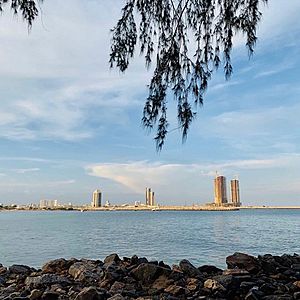
Victoria Island is south of Lagos Island and has very expensive properties, including many new luxury apartments. Along with Ikoyi, it's a major shopping area in Lagos. On its Atlantic coast, you'll find the rebuilt Bar Beach.
Ajah/Lekki The Lekki Peninsula is a prestigious area like Ikoyi and Victoria Island. It stretches out towards Epe and includes growing communities like Ajah, Awoyaya, and Sangotedo. There are many interesting places to visit here, such as the Lekki Conservation Centre, the Novare Mall, and the Lekki Free Trade Zone. You can also find Lagos Business School, Eleko Beach, Elegushi Beach, and Pan-Atlantic University in this area.
Iddo
Across the main lagoon channel from Lagos Island is a smaller area called Iddo. Iddo is a railroad terminus and is now part of the Lagos Mainland Local Government Area. It's connected to the Mainland like a peninsula.
The Mainland
Many Lagosians live on the Lagos Mainland, and most industries are located there. The Mainland is known for its music and nightlife, especially in areas like Yaba, Ikeja, and Surulere. However, more nightclubs have opened on the Island recently. Mainland LGAs include Surulere, Apapa, and Lagos Mainland. Suburban LGAs of Metropolitan Lagos include Agege, Amuwo Odofin, Mushin, Oshodi-Isolo, and Ikeja. Ikeja is where Murtala Muhammed International Airport is located and it's the capital of Lagos State.
Other important areas on the Mainland are Ebute Metta, Yaba, and Ejigbo.
Climate of Lagos
Lagos has a tropical savanna climate. This means it has a wet season and a dry season. The wet season runs from March to October, and the dry season is from November to February. June is usually the wettest month, and January is the driest.
Because Lagos is near the equator, its temperatures don't change much throughout the year. The average high temperatures range from 28 to 32 degrees Celsius (82 to 90 degrees Fahrenheit). March is usually the hottest month, and August is the coolest.
| Climate data for Lagos Island, 1991–2020 normals and records | |||||||||||||
|---|---|---|---|---|---|---|---|---|---|---|---|---|---|
| Month | Jan | Feb | Mar | Apr | May | Jun | Jul | Aug | Sep | Oct | Nov | Dec | Year |
| Record high °C (°F) | 36.0 (96.8) |
39.0 (102.2) |
40.1 (104.2) |
36.6 (97.9) |
36.7 (98.1) |
33.8 (92.8) |
33.0 (91.4) |
36.0 (96.8) |
34.6 (94.3) |
35.5 (95.9) |
36.0 (96.8) |
36.8 (98.2) |
40.1 (104.2) |
| Mean daily maximum °C (°F) | 31.5 (88.7) |
32.1 (89.8) |
32.2 (90.0) |
31.6 (88.9) |
30.9 (87.6) |
29.4 (84.9) |
28.4 (83.1) |
28.2 (82.8) |
29.1 (84.4) |
30.1 (86.2) |
31.4 (88.5) |
31.6 (88.9) |
30.5 (87.0) |
| Daily mean °C (°F) | 28.2 (82.8) |
28.9 (84.0) |
29.2 (84.6) |
28.7 (83.7) |
28.0 (82.4) |
26.7 (80.1) |
26.1 (79.0) |
26.0 (78.8) |
26.6 (79.9) |
27.3 (81.1) |
28.3 (82.9) |
27.8 (82.0) |
27.7 (81.8) |
| Mean daily minimum °C (°F) | 24.9 (76.8) |
25.7 (78.3) |
26.1 (79.0) |
25.8 (78.4) |
25.1 (77.2) |
24.1 (75.4) |
23.8 (74.8) |
23.8 (74.8) |
24.0 (75.2) |
24.5 (76.1) |
25.3 (77.5) |
24.1 (75.4) |
24.8 (76.6) |
| Record low °C (°F) | 18.5 (65.3) |
15.9 (60.6) |
20.2 (68.4) |
19.8 (67.6) |
18.4 (65.1) |
17.6 (63.7) |
15.7 (60.3) |
18.6 (65.5) |
18.6 (65.5) |
17.0 (62.6) |
14.0 (57.2) |
13.7 (56.7) |
13.7 (56.7) |
| Average precipitation mm (inches) | 10.5 (0.41) |
40.9 (1.61) |
68.4 (2.69) |
145.5 (5.73) |
235.8 (9.28) |
433.7 (17.07) |
208.9 (8.22) |
91.4 (3.60) |
217.9 (8.58) |
189.1 (7.44) |
51.5 (2.03) |
9.7 (0.38) |
1,703.3 (67.04) |
| Average precipitation days (≥ 1 mm) | 1.0 | 2.2 | 4.3 | 6.9 | 11.3 | 15.6 | 10.8 | 7.2 | 12.3 | 10.5 | 3.4 | 0.7 | 86.2 |
| Average relative humidity (%) | 77.7 | 81.3 | 84.2 | 86.0 | 86.7 | 88.2 | 88.5 | 88.0 | 89.0 | 88.2 | 84.3 | 78.8 | 85.1 |
| Average dew point °C (°F) | 23.9 (75.0) |
25.4 (77.7) |
26.2 (79.2) |
26.1 (79.0) |
25.6 (78.1) |
24.6 (76.3) |
24.0 (75.2) |
23.9 (75.0) |
24.6 (76.3) |
25.2 (77.4) |
25.4 (77.7) |
23.8 (74.8) |
24.9 (76.8) |
| Mean monthly sunshine hours | 164 | 168 | 174 | 189 | 176 | 114 | 99 | 105 | 121 | 167 | 186 | 197 | 1,843 |
| Mean daily sunshine hours | 5 | 6 | 6 | 7 | 6 | 4 | 3 | 3 | 4 | 5 | 6 | 7 | 5 |
| Source 1: NOAA (monthly sun hours 1961–1990) | |||||||||||||
| Source 2: Meteo Climat (record highs and lows)
Weather Atlas (daily sun hours) |
|||||||||||||
Climate Change Effects
Scientists predict that Lagos's climate will change in the future. By 2050, the average temperature could increase. Lagos is one of 12 major African cities that could be greatly affected by sea level rise. This means parts of the city might face more flooding. These changes could cause billions of dollars in damage if steps aren't taken to protect the city.
Economy of Lagos
Lagos is a huge economic powerhouse in Nigeria. It creates about 10% of the country's total wealth. Most businesses and financial activities happen in the central business district on the island. Many major banks and companies have their main offices here. Lagos is also a key center for information, communication, and technology (ICT) in West Africa. The city is moving towards a 24-hour economy.
Lagos is considered one of the most "globalized" cities in West and Central Africa. It's sometimes called "Africa's Hollywood, Manhattan, and Silicon Valley" because of its strong industries in film, finance, and technology.
Financial Institutions
Lagos is a major hub for banking and finance. The four biggest banks in West and Central Africa are based in Lagos. Many other large banks in the region also have their headquarters here.
Ports of Lagos
The Port of Lagos is Nigeria's most important port and one of Africa's largest and busiest. It handles more than half of Nigeria's sea trade. It also helps landlocked countries like Chad and Niger by serving as a transfer point for their goods. About 1,000 ships visit the Lagos port every year.
The Port of Lagos / Apapa is the oldest and biggest port in the country. The Tin Can Island Port was built in 1975, west of Apapa. In early 2023, the new deep sea port of Lekki opened about 50 km east of Lagos.
Entertainment and Media
Nollywood Film Industry
Lagos is the heart of West Africa's film, music, and TV industries. The film industry in the Surulere area is one of the largest in the world, sometimes even bigger than Hollywood! Nigerian films are becoming very popular and successful, breaking box office records.
Newspapers and TV
Many newspapers in Nigeria are produced in Lagos. Some popular ones include The Punch and Vanguard. For TV, the most-watched news channel in Lagos is Channels TV. Other channels like Arise TV and NTA are also popular.
"Africa's Silicon Valley"
Lagos is a growing hub for technology. Five of Africa's seven "unicorn" tech startups (companies worth over 1 billion euros) are based in Lagos. These include Flutterwave (virtual bank cards), Opay and Interswitch (online bookings), Andela (software engineer training), and Jumia (online shopping).
Lagos has more tech centers than any other city in Africa. With many internet users, it attracts investors. Some people call Lagos "Africa's Silicon Valley."
Lagos is the only African city with offices for both Google and Microsoft. Major mobile network providers like MTN and Airtel also operate here.
Oil Refinery and Other Industries
A huge new oil refinery in Lekki started working in December 2023. When it's fully running, it will process 650,000 barrels of oil every day, making it the seventh-largest oil refinery in the world! This means Nigeria can now produce its own fuels and other oil products.
Since 2022, a new fertilizer plant has been making 3 million tonnes of fertilizer each year. This helps fill a gap in the world market. Nigeria also has a large pharmaceutical industry, with many companies located in northern Lagos.
Automotive Industry
Nord Automobile Limited has two car assembly plants in Lagos. They make their own plastic parts and plan to do more manufacturing in the future.
Lekki Free Trade Zone
The Lekki Free Trade Zone is a special area in eastern Lekki. It's being developed into a big district for industry, trade, real estate, storage, tourism, and entertainment.
Trade Fairs and Exhibitions
Lagos has two big convention centers: the Eko Convention Center and the Landmark Centre. They host many events, like the Lagos Fashion Fair and other trade shows. The Lagos Leather Fair is the biggest leather fair in West Africa.
Food Processing and Distribution
Nigeria's largest brewery, Nigerian Breweries, is in the Surulere district. The Guinness brewery is in Ikeja. Both also make non-alcoholic malt drinks.
Lagos State is building a huge "Food Logistics Park" in Ketu-Ereyun. This will be the biggest food logistics hub in Sub-Saharan Africa. It will help get food to people faster and reduce waste.
The hulling mill in Imota, just outside Lagos, processes rice grown in Nigeria. It's the largest plant of its kind south of the Sahara. The Apapa sugar refinery is also very large and supplies sugar to many companies. New fruit markets have also opened to improve food supply.
Timber and Sawmills
The Lagos sawmill moved to Timberville in 2022, where it has modern facilities.
Tourism in Lagos
Lagos is becoming a popular place for tourists. Many people, especially from other parts of Africa, visit to experience Nigeria, often inspired by Nollywood movies.
Beaches and Water Sports
Lagos has beautiful sandy beaches along the Atlantic Ocean, like Elegushi Beach and Alpha Beach. There are also private beach resorts, including Landmark Beach. You can enjoy boat tours, kayaking, and jet skiing on the water.
Nightlife, Shopping, and Dining
Lagos has a lively nightlife, especially on Victoria Island. Rooftop restaurants offer great food, views, and a cool breeze from the sea. Lagos can be an affordable place to visit. The Lekki Arts and Crafts Market, also known as Oba Elegushi Market, is a huge market where you can find many African arts and crafts.
Parks and Gardens
Freedom Park is a special park in Lagos Island. It used to be a prison but was turned into a memorial and recreation park. It helps preserve Nigerian history and culture. It's a peaceful place for people to visit and enjoy.
Tinubu Square (formerly Independence Square) is an open space on Lagos Island. Tafawa Balewa Square is a large stadium where Nigeria's independence was declared in 1960. Ndubuisi Kanu Park is another popular green space for relaxation.
Zoos and Nature Parks
The Lekki Conservation Centre is like Lagos's zoo. It's a fenced area that looks like a rainforest, with monkeys, birds, snakes, and crocodiles. There's also a small museum. Lufasi Nature Park helps protect nature and endangered animals.
Famous Buildings
- National Theatre, Iganmu: A very striking building that was recently renovated. It's now easy to reach by the new "blue line" of the Lagos light rail.
- Lekki-Ikoyi Link Bridge: The first cable-stayed bridge in Nigeria.
- The Oba's (Kings) Palace at Iga Idunganran: An old palace for the Oba of Lagos, who keeps the traditions of the Eko people.
- Cathedral Church of Christ, Lagos: An Anglican church built between 1867 and 1869.
Statues
- Herbert Macaulay memorial statue.
- Welcome to Lagos statue: Shows three Lagos white cap chiefs. They are said to warn visitors to be smart and not foolish while in Lagos.
Other Tourist Spots
- Takwa Bay: A popular bay where you can watch ships and enjoy water sports.
- Festac Town.
Culture of Lagos
Lagos is a major cultural center in Nigeria. Because it's a port city and was a starting point for British colonization, it has a strong Western influence. People from all Nigerian ethnic groups live here, making it a true melting pot, though the Yoruba are the largest group. The city's music and film industries are very lively and famous around the world.
Important Buildings
The National Arts Theatre is a very noticeable building in Lagos. Its renovation was finished in March 2023. The new "blue line" of the Lagos light rail makes it easy to get to. Another often-photographed building is the Lekki-Ikoyi Link Bridge. The Cathedral Church of Christ is in the oldest part of Lagos.
Art Galleries
The Nike Art Gallery is one of the largest art galleries in West Africa. It has about 8,000 artworks by Nigerian artists. The Red Door Gallery focuses on modern African art. The Ovuomaroro Studio and Gallery is one of the oldest art galleries in Lagos. The Alexis Galleries also shows and promotes Nigerian contemporary art.
Museums
The National Museum on Lagos Island has collections of old artifacts and traditional art. You can also buy Nigerian arts and crafts there. The John K. Randle Centre has an exhibition on Yoruba culture. It's a new kind of museum that uses modern ways to tell stories inspired by Yoruba traditions. The Kalakuta Republic is a museum dedicated to the famous musician Fela Kuti. The Mindscape Children Museum is Nigeria's first children's museum, designed for social interaction and curiosity.
Performances and Festivals
The Muson Centre (Musical Society of Nigeria) is a place for theater and music performances. They hold concerts with both Nigerian and Western music.
Lagos hosts many festivals throughout the year. These include the Lagos Carnival in January, the Eko International Film Festival in March, the Lagos Black Heritage Carnival in April, and the Lagos Photo Festival in November. There's also the Book & Art Festival and the Lagos Food Festival in November and December. The Lagos Jazz Festival features different music genres. The Eyo Carnival is a special festival that happens sometimes.
Delicious Food
Lagos has many famous local dishes. Some popular ones are eba and egusi, amala and ewedu, and jollof (a favorite party dish). You can also find suya (spicy grilled beef) and eba (made from cassava). Besides local food, you can find European, Middle-Eastern, and Asian dishes.
Music Scene
Lagos is famous for its music scene across Africa. It has a lively nightlife and has created many music styles like Sakara music, Nigerian hip hop, highlife, juju, fuji, and Afrobeats. Many international musicians have performed in Lagos, including James Brown, Paul McCartney, Sean Paul, and Beyoncé.
Film Locations
The Surulere district is the center of Nigeria's film industry, known as Nollywood. Lagos itself is often used as a setting for movies, both Nigerian and international. For example, a scene in the 2016 film Captain America: Civil War takes place in Lagos. The film 93 Days tells the true story of the Ebola outbreak in Lagos in 2014 and was filmed in real locations.
Sports in Lagos
Football is the most popular sport in Lagos. Some well-known football clubs from Lagos include Bridge Boys F.C., MFM F.C., and First Bank. The Nigeria national football team, also called the Super Eagles, used to play most of their home games at the Lagos National Stadium in Surulere. Lagos also hosted the 2nd All-African Games in 1973.
Education in Lagos
The Lagos State Government runs public schools. Nigeria uses the 6-3-3-4 education system: Primary, Junior Secondary School (JSS), Senior Secondary School (SSS), and university. All children get basic education, with a focus on the first nine years. Many schools are funded by the federal government and are often boarding schools. Lagos also has its own federal high schools like Federal Government College Ijanikin, King's College Lagos, and Queen's College Lagos.
Lagos has many colleges, universities, and vocational schools, run by both the government and private groups.
Vocational Schools
- Institute for Industrial Technology (IIT): Teaches technical skills to young men from families with limited money.
- Federal College of Fisheries and Marine Technology: Offers courses in fishing, marine engineering, and nautical science.
Polytechnics
- Yaba College of Technology (YABATECH): Nigeria's first higher education school, founded in 1934.
- Lagos State Polytechnic: Has many schools and was founded 25 years ago.
- Lagos City Polytechnic: The first private polytechnic in Nigeria, started in 1990.
Universities
- The University of Lagos (UNILAG) Akoka: A large university founded in 1962 with over 55,000 students.
- Lagos State University (LASU): A university with multiple campuses, owned by the Lagos State government.
- Pan-Atlantic University: Known for its business school (LBS) and School of Media and Communication.
- National Open University of Nigeria: The first open university in Nigeria.
- Caleb University: A private university.
- Lagos State University College of Medicine (LASUCOM), Ikeja.
- College of Medicine, University of Lagos (CMUL).
Healthcare in Lagos
Lagos has many hospitals and medical centers. The oldest Nigerian hospital is located here. Lagos also has West Africa's first air ambulance service. Healthcare in Lagos is provided by both public and private hospitals.
Transportation in Lagos
Lagos has one of the largest road networks in West Africa. It also has suburban trains and ferry services. Roads can get very crowded during busy hours because of the city's growth. Many highways and bridges connect different parts of Lagos.
Major Highways
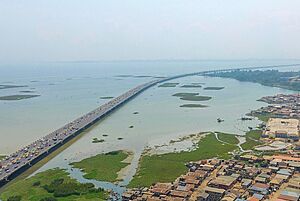
The Lagos–Ibadan Expressway and the Lagos–Abeokuta Expressway are important highways that connect Lagos to other states. The Lagos–Badagry Expressway leads to towns like Festival Town. Lagos is also the starting point for three major Trans-African Highway routes.
Public Transport
The Lagos Metropolitan Area Transport Authority (LAMATA) manages public transport. Since 2021, you can pay for buses and light rail with a special public transport card instead of cash.
City Buses
Lagos has two main city bus companies: BRT (Lagos Bus Rapid Transit System) and LBSL (Lagos Bus Services). These buses are air-conditioned. BRT buses have special lanes on some main roads to avoid traffic. The Oshodi Bus Terminal is a central hub for buses and is the largest bus station in West Africa. In May 2023, electric buses were introduced in Lagos.
Metro Rail
The first part of the Lagos Light Rail system, called the "Blue Line," started running in February 2023. It connects Mile 2 and Marina. Other lines, like the "Red Line," are being built. There are plans for even more light rail lines in the future. In early 2024, it was announced that the Lagos suburban railway had carried 583,000 passengers in its first four months.
Train Services
Since June 2021, Lagos has a modern train station, Mobolaji Johnson, and a double-track line to Ibadan. The Lagos-Ibadan train runs several times a day.
Yellow minibuses called "Danfo" are a popular way to get around. They run on fixed routes like shared taxis and are a common sight in the city.
Ferries
Many people use ferries to travel in Lagos, as it can be much faster than driving. About two million passengers use ferries each month. Five Cowries Terminal is the main ferry terminal in Lagos. It's a modern terminal with many facilities and connects to different parts of the city.
Air Travel
Lagos is served by Murtala Muhammed International Airport, one of Africa's largest and busiest airports. It's Nigeria's main international airport and has been renovated many times. A second airport, Lekki-Epe International Airport, was approved in April 2023.
Waste, Water, and Sewage
Waste Management
In Lagos, about 40% of waste is collected, and only 13% is recycled. The city produces about 13,000 tonnes of waste every day.
Water Supply
Tap water in Lagos is not safe to drink, but it can be used for cooking and showering. The city gets its water from the Ogun and Owo rivers. Many people in Lagos live in areas without easy access to clean piped water.
Sewage System
Lagos needs a better sewage system. Wastewater often flows into open drains, which can carry pollution into rivers and the lagoon. This can also affect groundwater and well water.
Famous People from Lagos
Many famous people come from Lagos. You can find a list of them in the article about List of people from Lagos.
Sister Cities
Lagos is connected with other cities around the world as "sister cities." These include:
 Atlanta, United States
Atlanta, United States Gary, Indiana, United States
Gary, Indiana, United States Belo Horizonte, Brazil
Belo Horizonte, Brazil Bucharest, Romania
Bucharest, Romania Port of Spain, Trinidad and Tobago
Port of Spain, Trinidad and Tobago
Images for kids
See also
 In Spanish: Lagos para niños
In Spanish: Lagos para niños
 | Jackie Robinson |
 | Jack Johnson |
 | Althea Gibson |
 | Arthur Ashe |
 | Muhammad Ali |


